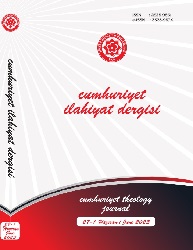Allah’ın Kulların İrâdî Fiillerini Önceden Bilmediğini Öne Süren Görüşün Tefsir İlmi Açısından Kritiği
The Critique of the Opinion Claiming that Allah Does not Know Beforehand the Willing Acts of the Slaves in Terms of the Science of Tafsīr
Author(s): Fatih ÇelikelSubject(s): Philosophy of Religion, Contemporary Islamic Thought, Hermeneutics, Qur’anic studies
Published by: Cumhuriyet Üniversitesi İlahyat Fakültesi
Keywords: Tafsīr; Allah; Knowledge; Destiny; Unseen;
Summary/Abstract: Some verses of the Qur’ān can be understood at the face value to mean that Allah knows certain things later. Based on such verses, it has been suggested that Allah knows the voluntary acts of the servants after they have taken place. This view, which traces its historical origin back to Jahmiyya, is defended by Abdülaziz Bayındır today. Bayındır refers primarily to the thirty-first verse of the chapter Muhammad and other verses of similar meaning. In their literal meaning, these verses speak of Allah subjecting the believers to trials in order to know those who are patient, those who strive for jihad, and so on. Bayındır argues that expressions such as , حَ ى تٰ مَٰٰ َ عْل َ نٰٰ مّاٰ َ وَل مٰ َ يَعْل هٰٰٰ ٰ اللّ in the relevant verses should be understood in their literal meanings, and argues that such verses indicate that Allah does not know the volitional acts of the servants before they happen. Bayındır tries to support this view with some findings. According to one of them, the verses expressing that Allah knows everything, since the word “thing” means existing, actually tells that He knows everything that exists. In addition, giving the meaning of willing to the word shā-a, which is derived from the word “thing/shay”, is a distortion and these wrong meanings have been deliberately inserted into the dictionaries. According to Bayındır, who said that the claims he made should be tested not through philosophical and theological answers, but through the Qur’ān, it is necessary to know Allah as he introduces himself in the Qur’ān. Since it is understood from the outward appearance of some verses in the Qur’ān that Allah knows the willful actions of His servants later, there is no need to think contrary to the Qur’ān in this matter. Various objections were raised to these views of Bayındır, and he tried to answer these objections. One of these objections according to the general opinion, concerns the parable between Moses and Khidr. In this parable, Khidr killed a child and showed that the child would lead his mother and father astray in the future as a justification. This is the proof that Allah knows beforehand the voluntary actions of His servants. Bayındır answers this objection by arguing that God gave the order to kill the child, out of a possibility. The Surah Muhammad, which Bayındır uses as a reference, is a Madīnan surah and it is known that Muslims and hypocrites live together in Madīna. Therefore, Muslims and hypocrites must be differentiated in order to understand the verses in the Qur’ān that advise how to treat hypocrites. In addition, it is understood from many other verses of the Qur’ān that Allah knows the voluntary actions of His servants beforehand. Therefore, the verb to know in the thirty-first verse of the chapter Muhammad; means to distinguish, to see, to reveal, etc. It has been seen that it should be understood in a way that is more suitable for the integrity of the Qur’ān and the context of the relevant verse. It has been seen that it is not possible to accept his explanation of the incident that took place between Moses and Khidr. Because, when this explanation is accepted, it has been determined that it can be claimed that Allah does not see any harm in killing children based on probability, and that this is contrary to the verses that absolve Allah from cruelty. In this study, Bayındır’s claims and their analysis are briefly examined within this framework. In the study, the analysis and criticism method was used, the validity of the asserted claims, the determination and criticism of the adopted methodology were aimed. In conclusion; the method adopted by Bayındır has been verified through different verses, and it has been seen that this does not reveal a complete understanding and interpretative methodology. It has been determined that an approach that consists of trying to understand the words literally is an incomplete method that can lead to wrong conclusions. Therefore, it has been seen that criteria such as the integrity of the Qur’ān and its basic truths, the context of the text, and the truth-metaphor relationship should be taken into account in order to reach healthy results in the interpretations of the Qur’ān. It has been concluded that the verses that Bayındır put forward as a basis for his thesis do not indicate that Allah knows the voluntary acts of the servants afterwards, but that He reveals what He knows in his pre-eternal knowledge.
Journal: Cumhuriyet İlahiyat Dergisi
- Issue Year: 27/2023
- Issue No: 1
- Page Range: 150-166
- Page Count: 17
- Language: Turkish

